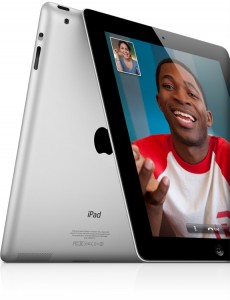You may want an iPad now, but do you need one?

One thing that has struck me as missing from all the analysis of the iPad 2 launch, and the earlier initial iPad coverage, was a point that, in a couple decades of doing product reviews, was usually the key to understanding the products. That point is what is known as "suitability to task."

See also:
- The iPad 2 is here, but laptops are not going away any time soon
- Your choice: Motorola Xoom or Apple iPad 2?
- Apple iPad 2: Why I'm hitting the Amex again
- iPad vs. iPad 2 - What's changed?
- Why nearly everybody will want an iPad 2
- Lusting for iPad 2? Get top dollar for your iPad 1
- Does Apple's iPad 2 further dent Microsoft's iPad compete plans?
Around the holidays last year I wrote a piece on the process which led my fiancée to select the Samsung Galaxy Tab as the most practical tablet option for her needs. The reasons for her haven't changed, but after spending a week at a trade show with her, her boss did ask me if he should standardize on tablets for their field sales people. He really appreciated the way she could use the tablet to quickly demo their website and run some of their promotional videos, all while talking with customers; not to mention the easy access to readable email, especially when compared to his Blackberry or her iPhone. And he was interested in standardizing on the iPad.
But for him, the deal breaker turned out to be the need to use iTunes. My fiancée's process for prepping material for trade shows was to put together a package of all her necessary materials in a folder on her desktop, then simply mounting the Tab as an external drive and dropping that folder onto it. If she needs to have local vendor print additional handouts or any of those sorts of collateral material, she can either email them to the vendor or simply stop at the local print shop, which these days are used to pulling data from a USB stick, and plug in her Tab the same way. When some of those files are multiple megabytes in size, this is sometimes the only realistic way to move the data.
This was just one of many issues which revolved primarily around easy connectivity and the availability of a microSD card. For his field staff, often in places with limited connectivity and with a need to move to the reps and the customers, the tethered nature of the iPad to iTunes, meant that the device was simply not suitable to the task. Given the number of tech people that hoped that a card slot would be available in the iPad 2, I don't think that this decision process is an uncommon one. To many people the response to the lack of that slot is ‘users can store their extra data on the cloud' (or some similar comment), which is true, but not practical for people who can't guarantee continuous, high-speed connectivity.
With many of my clients, they were looking at the iPad as a potential notebook replacement. About half of them had purchased at least one iPad to give a test run; none of them purchased more than that for this express purpose. They had different decision matrixes, but reached similar conclusions; that the iPad was less suitable than an ultra-light notebook for their business needs, and the additional cost of the notebook was justified by the greater productivity. Once again, the iPad failed their suitability to task test.
One group of users that surprised me was the college age user to whom technology is more of a second nature. I really expected iPads to be much more prevalent than they were among the dozens of tech savvy college students I interact with through my children. They all have the latest smartphones, primarily iPhones, are inveterate users of Twitter, Tumblr, and texting, and are, in the majority, owners of Apple notebooks or desktops.
What I found, after talking to them about the iPad, was upon reflection, not surprising. Quite a few had iPads, but for most, they were special purpose items that they didn't use regularly like their iPhone or iPod. But for those who were adamant in their support of the iPad there was a common thread; they were willing to change the way they worked, to accommodate the technology, rather than to pursue technology that fit their existing needs or work patterns.
Seriously using a tablet computer of any sort right now will mean accommodating your needs to that of the technology. To many users, they are able to make minimal changes that allow choices other than the iPad to fit their business needs. Some businesses will be implementing new processes that fit what the iPad can deliver. But it is clear that despite the hype, the tablet market is still incredibly young and open for grabs. And that tablets, as exemplified by the iPad and current and forthcoming Android-based competitors, are still not an overall replacement for general purpose computing.